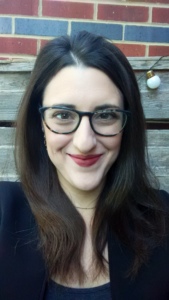News
Meet the Fellows: 2020 Newcombe Fellow Joanna Demaree-Cotton

Joanna Demaree-Cotton • Yale University, philosophy
Rehabilitating Moral Agency in the Age of Cognitive Science
Each year, Citizens & Scholars invites new Fellows to submit a brief story introducing themselves and/or their work. This story is from 2020 Newcombe Fellow Joanna Demaree-Cotton. Joanna is a doctoral candidate in philosophy at Yale University whose dissertation asks whether we can trust our moral instincts and act ethically in light of scientific discoveries in moral psychology.
Growing up, I learned (as many do) the value of empathy and non-judgmental listening as a way of connecting to people. Even when you disagree with someone, if you’re willing to listen, you almost always find that they have reasons, and those reasons make sense. Appreciating that about each other is central to humanity.
By the time I was a teenager I was pulling books about psychology from my parents’ bookshelf. I was fascinated: what we feel, think, decide to do—the things that are most intimately familiar to us—turned out to be connected to and explained by utterly unfamiliar, alien and surprising mechanisms, from deeply subconscious processes to evolutionary pressures from millions of years ago. I had to learn more.
But how could this be reconciled with empathy, with humanity? These scientists said that it couldn’t: we are irrational machines, driven by unconscious and evolved processes that only give us the illusion of having reasons. Thoughts? Just brain activity. Moral values? Just evolutionary adaptations. Moral convictions? Just illusions, rationalizations for covering the true causes of behavior.
Were they right? I took Religious Studies GCSE and A-level in school, in which I began to learn how to use philosophy to examine questions about what it all meant. We studied arguments in ethics about the difference between right and wrong, and arguments in philosophy of religion about the nature of the self and the relation of the mind to the body. I felt that I needed to learn more about the science, but that I couldn’t study the science without asking the philosophical questions as well. So, aged 17, I applied to study a joint degree of philosophy and psychology at Oxford.
Of course, my academic path after that meandered in all sorts of directions throughout my undergraduate degree and later my masters and PhD. In a way, though, my PhD dissertation at Yale goes back to those questions I had when I was a teenager. What does science say about our ethical values? Can we reconcile this science with our humanity and a conviction that we do have reasons and we can tell right from wrong? In my research, I hope to show that we can.

